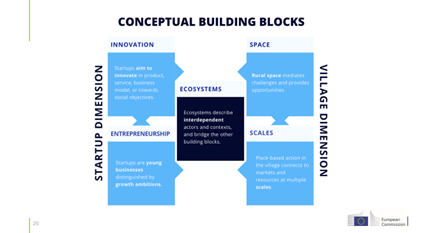Rural innovation ecosystems: key learnings

On 30 May 2024, the Policy Learning Platform hosted the the webinar on rural innovation ecosystems.
During this webinar, we learned from innovative approaches, effective techniques, and actionable suggestions, all illustrated with Interreg Europe projects.
Explore the recording, key learnings and presentations below.
Webinar agenda
The webinar has been designed and moderated by Marc Pattinson and Laura Varisco, Thematic Experts for a Smarter Europe.
00:00:59 Introduction by Marc Pattinson and Laura Varisco
00:14:40 Keynote speech by Simone Sasso, DG Joint Research Centre on the Enhancing innovation ecosystems in European rural areas
00:35:42 Q&A: are there collaborations among village located in cross-border areas?
00:40:00 Q&A: what are the solutions to overcome barriers in fostering social innovation and economy in rural areas, such as low-population density and distance?
00:41:25 Presentation on Shared productive units for the agrifood sector by Marco Alves from Tagus Valley, Portugal.
00:55:45 Q&A: you mentioned skills traction and retention in these areas. Is it a challenge to attract and retain staff and companies in rural areas?
01:01:10 Presentation of a case study on Tech Hub Fosshaugane Campus by Ingjerd Skogseid, Senior advisor at Vestland City Council (Norway), P-IRIS project
01:16:23 Q&A: the football club appears to be a key catalyst in the process. Did it realise they would have this role of being an urban coffee machine?
01:21:22 Q&A: what emphasis does the Startup Village Mapping Tool give to the issue of networking?
01:26:25 Concluding remarks by the panelists on their vision of rural innovation ecosystems.
The event brought together three panelists who addressed pressing challenges faced by rural regions, such as shifting demographic trends, resource limitations, and others.
Innovation contributes to mitigating these gaps and provides solutions that bridge and address the growing discontent between rural and urban areas.
Simone Sasso, from the Joint Research Centre, delivered a keynote presentation on fostering place-based innovations in rural areas, presenting the Startup Village initiative. He emphasised the critical role of connectivity and presented Five Building Blocks essential for thriving rural ecosystems.

This framework outlines the connection between the startup and village dimensions, unified by ecosystems. Startups focus on innovation in products, services, business models, or social goals, and are driven by growth ambitions. In rural areas, space provides challenges and opportunities, while scales highlight place-based actions linking village contexts to broader markets and resources. Ecosystems, at the centre, describe the interdependent actors and contexts that bridge these elements, emphasising the dynamic interaction between innovative startups and rural opportunities.
The webinar also featured some good practices by Marco Alves from Tagus Valley, Portugal, who presented the Food Fab Lab (AgriRennaissance), a cutting-edge infrastructure supporting emerging technologies in agri-food production, as well as by Ingjerd Skogseid, from Region Vestland, Norway, who presented Tech Hub Fosshaugane Campus (P-IRIS).
